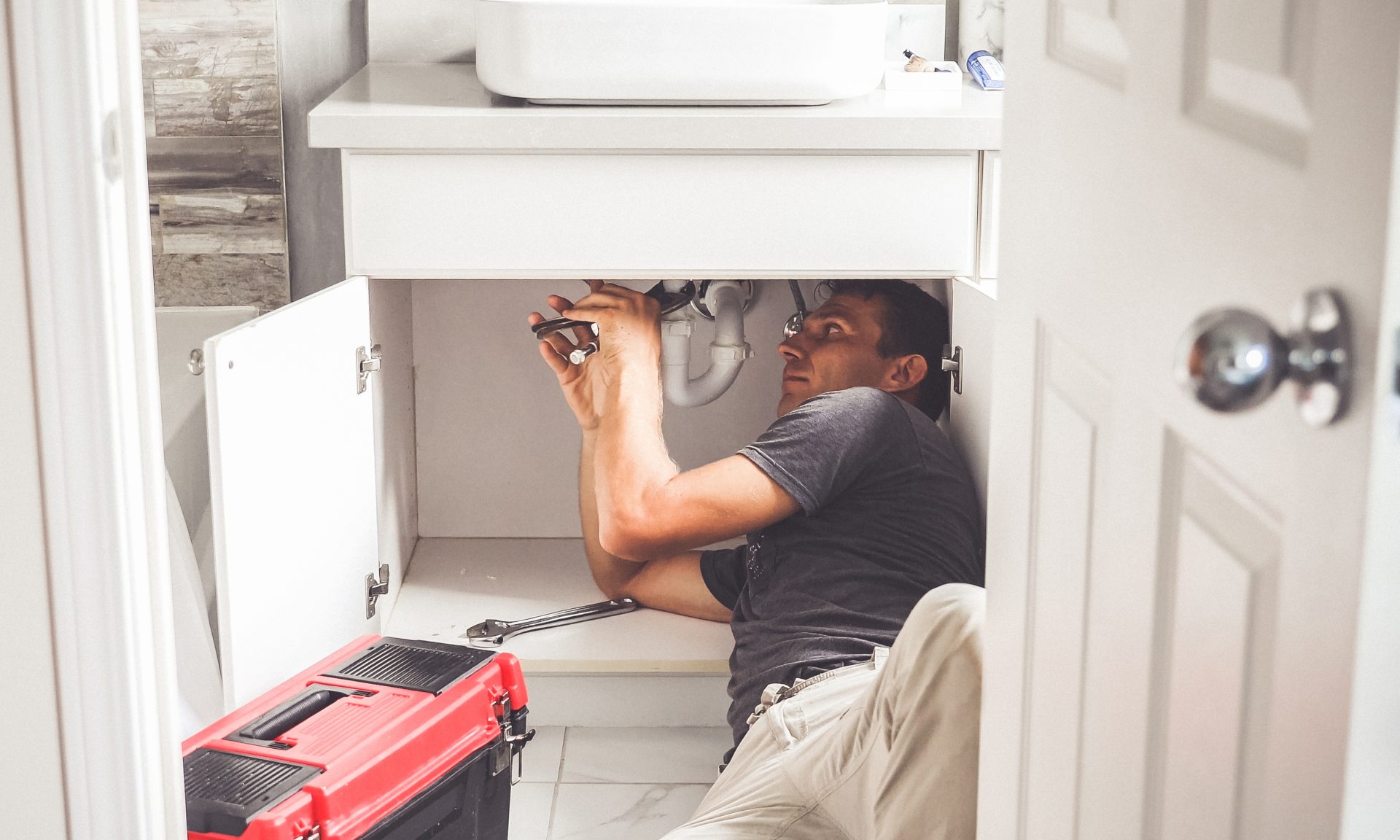Handyman Insurance: Best Companies, Coverage and Costs
Most handymen will need general liability insurance, commercial auto coverage and protection for their tools and equipment.

Many, or all, of the products featured on this page are from our advertising partners who compensate us when you take certain actions on our website or click to take an action on their website. However, this does not influence our evaluations. Our opinions are our own. Here is a list of our partners and here's how we make money.
Handymen face physical and professional risks everyday. Insurance can help protect your business's finances from them.
Handymen should have at least general liability insurance. This covers claims of bodily injury, property damage or advertising injury.
But typical handyman businesses will also likely benefit from:
- Tools and equipment insurance.
- Commercial auto insurance.
- Workers' comp insurance (your state may require it).
Here’s what to know about handyman insurance and how to find the right coverage for your needs.

Save up to 30% on business insurance
NerdWallet Small Business helps you get real-time quotes from 30+ insurers, and instant access to your Certificate of Insurance (COI) through our partner, Coverdash.
Best handyman insurance companies
NerdWallet’s editorial team chooses the best business insurance companies based on many factors. For handymen, we focused on insurers that:
- Receive relatively few general liability complaints to state insurance regulators based on their size.
- Offer commercial auto insurance and some form of tools protection (potentially as part of a business owner’s policy).
- Are financially strong according to credit rating agencies, meaning they have the ability to pay claims.
- Make it easy to get a quote and buy a policy.
Here are some of our top insurance companies that serve handypeople. We recommend getting multiple quotes to find the best coverage at the best price.
 Why trust NerdWallet
Why trust NerdWallet
250+ small-business products reviewed and rated by our team of experts.
80+ years of combined experience covering small-business and personal finance.
Objective, comprehensive small-business insurance ratings based on the financial strength, complaint records, digital features and customer service availability of insurance market leaders. Read our methodology.
NerdWallet's small-business insurance content — including our ratings, reviews and recommendations — is produced by a team of writers and editors who specialize in small-business finances. Their journalism has appeared in The Associated Press, Washington Post, MarketWatch, Nasdaq, Entrepreneur, ABC News, MSN and other national and local media outlets. Each writer and editor follows NerdWallet's strict editorial guidelines to ensure fairness and accuracy in our coverage.
Nationwide
A business owner’s policy from Nationwide will cover your tools and equipment, general liability and any commercial property you own or rent for your handyman business. Nationwide stands out for its relatively low number of complaints. You can get a quote online but will need to talk to an agent to make the purchase and receive proof of insurance. Read NerdWallet’s Nationwide review.
Ergo Next
If you need general liability insurance quickly for your handyman business, Ergo Next may be able to help you get covered in minutes. The company sells business policies online and offers industry-tailored packages, including for handymen (and women!). Read NerdWallet’s Ergo Next review.
The Hartford
The Hartford is another good option for a business owner’s policy. It goes beyond the typical features and includes coverage for your property and equipment. You can also tack on commercial auto coverage, so all the insurance for your handyman business is in one policy. You have to buy your policy over the phone, though. Read NerdWallet’s The Hartford review.
Huckleberry
Huckleberry is an insurance broker. Since it doesn't underwrite insurance policies, we don't give it a star rating.
Huckleberry lets you compare policies for your handyman business from different companies. This can help ensure your insurance is totally custom, but the downside is that you may end up with policies from multiple carriers. Read NerdWallet’s Huckleberry review.
🤓 Nerdy Tip
To perform work in certain states, you may need a handyman or contractor’s license. You may be required to show proof of business insurance to be eligible for a license, among other requirements. Check your state and local regulations to ensure that you’re in compliance. Which types of insurance do handyman businesses need?
The insurance policies you purchase should protect your handyman business from the specific risks your business faces.
For instance, a business with employees will likely need workers’ compensation for work-related injuries or illnesses. That coverage may be less of a priority for a self-employed sole proprietor.
Think about the hazards, weather events and accidents that may impact your business. Factors like your location, type of work, business assets and number of employees will contribute to your needs as well.
General liability insurance for handyman businesses
At a minimum, most handymen will need general liability insurance. Your state, city or clients may require this coverage for certain projects or work agreements.
General liability insurance typically covers costs and legal fees from:
- Bodily injury. These are injuries that result from your business operations, other than those you or your employees sustain. If a client trips and falls over your tool box, this policy would help pay for any associated medical, legal and settlement costs.
- Property damage. This is damage to someone else’s property that your business causes. If you’re installing curtains in a client’s window and accidentally shatter the glass, your general liability policy would help cover the costs to replace it.
- Personal or advertising injury. These include claims of libel, slander or copyright infringement made against your business. If you create marketing materials for your business, unknowingly using a trademarked phrase, and the owner of the trademark sues, this insurance would cover associated legal and settlement costs.
Workers’ compensation for handymen
Most states require employers to have workers' compensation for their employees. Clients may also require it, even if you’re an independent contractor.
Even if it’s not a legal necessity, you may still want workers’ compensation as a handyman. It covers more than health insurance, which may not pay for job-related injuries or illness in certain instances.
Workers’ comp can pay for:
- Medical care. This includes doctor visits, surgeries, medication and medical equipment related to the injury or illness.
- Rehabilitation services. This can include physical or occupational therapy. Some policies pay for job training that helps employees start a new career if they can’t return to work.
- Disability and lost wages: Workers' comp can replace part of an employee’s lost income due to disability.
- Survivor benefits: If an employee dies, workers' comp pays their family a portion of the lost income. It typically helps cover funeral costs, too.
Additional handyman insurance options
| Type of insurance | What it covers |
| Vehicles used for business purposes. Covers accident-related costs that result from injuries or property damage regardless of who caused the accident. If you’re delivering materials to a job site and accidentally sideswipe another car, this policy would cover damage to the vehicle and any injuries the driver sustains. | |
| Damage to business building, equipment and inventory caused by certain hazards, accidents or weather events. Commercial property insurance would cover the cost to replace tools and supplies if an electrical fire in your workshop destroyed them. | |
| Tools and equipment insurance | Repair and replacement of stolen, damaged, broken or vandalized tools and equipment. Can cover equipment on the job, stored in a workshop or in your vehicle. If someone breaks into your truck at a client’s house and steals your tools, this policy can help cover the costs to replace them. |
| Claims against your business for errors or oversights, professional negligence, breach of contract or failure to deliver a service on time. If you recommend and install a series of light fixtures in a client’s store and they later sue you, claiming the fixtures led to a drop in customers, your professional liability insurance would cover associated legal or settlement costs. |
You might also consider combining multiple handyman insurance policies into a business owner’s policy, or BOP. Business owner’s policies typically combine general liability insurance, commercial property insurance and business interruption insurance. However, insurers can often customize coverage to your needs.
How much is handyman insurance?
Insurance costs for your handyman business depend on the policies you need and the size of your business. To get an idea of general liability and workers’ compensation costs for handyman businesses, check out these median rates provided to NerdWallet by online brokerage Coverdash.
| Category | General liability cost | Workers’ comp cost |
|---|---|---|
| Remodeling & home renovation | $1,400 | $3,200 |
| Plumbing (residential) | $2,200 | $4,800 |
| Automotive engine repair | $2,200 | $3,500 |
| Janitorial services | $750 | $2,500 |
| Landscaping services | $1,400 | $4,000 |
Business owner's policies for residential plumbing and automotive repair businesses have typical annual costs of $4,500 and $4,200, respectively.
How to get handyman insurance
You have a few different options to shop for the right insurance for your handyman business. No matter which route you choose, these are the basic steps:
- Assess your risks and coverage needs.
- Gather quotes from multiple providers to find the best price.
- Compare coverage, exclusions, limits and price.
- Purchase your policy and obtain a certificate of insurance.
- Review your coverage regularly as your business grows or regulations change.
You can do all this through a broker, online marketplace or on your own by contacting business insurance providers directly. There are pros and cons to each method.
Contact insurance providers directly
Online insurance companies like Ergo Next, as well as more traditional companies like Progressive, design policies specifically for handyman businesses.
If you have an existing relationship with a provider or have a good understanding of the coverage you need, you might decide to contact them directly to get quotes and purchase your policies.
Depending on the business insurance company, you may be able to get a business insurance quote online or over the phone. Some companies also connect you with a local agent who will discuss your insurance needs and provide a customized quote..
Use an online marketplace
Online marketplaces allow you to compare quotes from multiple insurance providers at once. These marketplaces typically provide customer support representatives who can discuss your coverage needs and answer any questions you may have.
Most marketplaces let you get quotes online. However, some also offer phone-based quotes.
| Good choice if: | Possible downsides: |
| You want to be able to compare quotes from several providers at once — without the hassle of contacting each company separately. | The quotes you receive will be limited to the insurance providers within the marketplace network. |
| You want to streamline the shopping process and purchase a policy quickly. | You may not be able to manage all parts of your policy, post-purchase, through the marketplace. |
| You want to manage the buying process on your own, but would like the option to contact an expert for advice and support. | Processes may become confusing with several points of contact involved — between you, the marketplace, the provider you choose, etc. |
Work with a broker
Insurance brokers offer a greater level of personalized attention. They work with you to understand the types of policies you may need, contact providers for quotes and help you compare your coverage options.
| Good choice if: | Possible downsides: |
| You want a single point of contact for shopping and purchasing insurance. | Some brokers charge a fee for their services. |
| You are unsure what type of insurance you need; you’ve never purchased business insurance before. | Brokers are not required to find you the most affordable policies. |
| Brokers work on a commission structure, which means they might try to sell you additional policies or add-ons. |
The knowledge and experience of an insurance broker can be useful, especially for businesses with more complex coverage needs. On the other hand, handyman businesses that only need a standard general liability policy may find that working with a broker is slow and not as beneficial compared to other choices.
Article sources
NerdWallet writers are subject matter authorities who use primary,
trustworthy sources to inform their work, including peer-reviewed
studies, government websites, academic research and interviews with
industry experts. All content is fact-checked for accuracy, timeliness
and relevance. You can learn more about NerdWallet's high
standards for journalism by reading our
editorial guidelines.
Related articles






